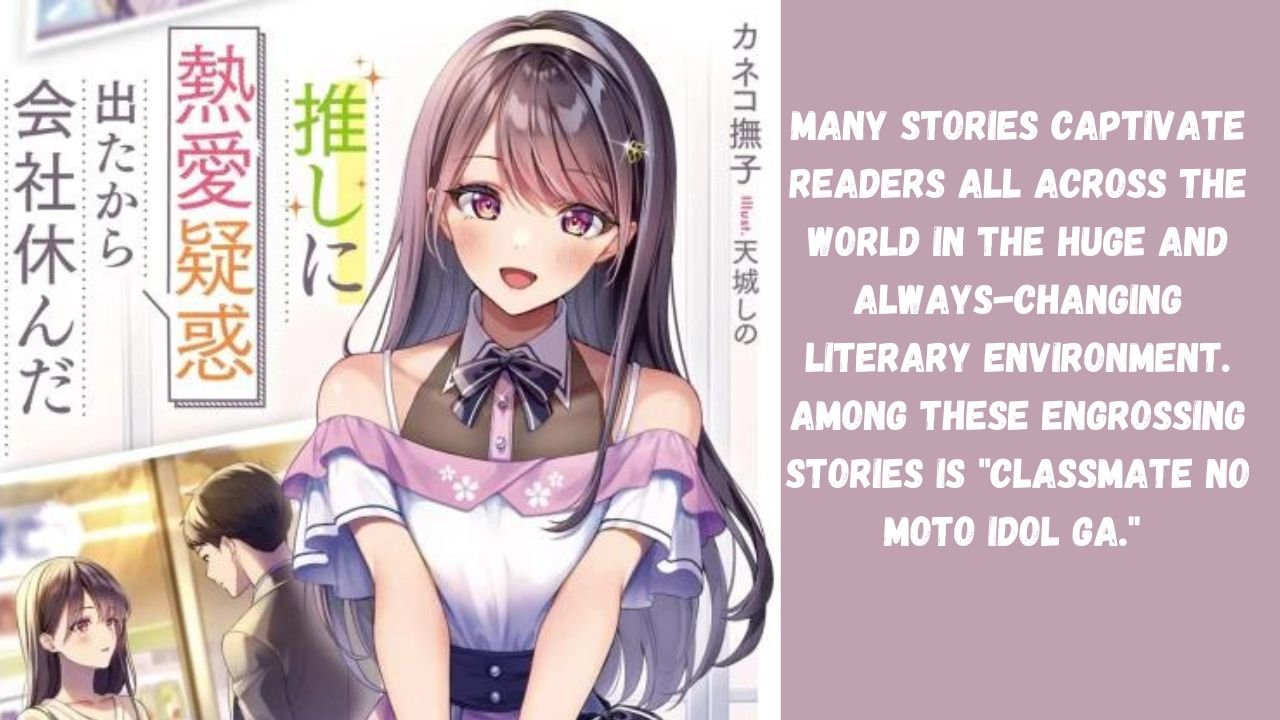Many stories captivate readers all across the world in the huge and always-changing literary environment. Among these engrossing stories is “Classmate no Moto Idol Ga.” Deeply exploring the author’s complex universe, this article looks at the story, characters, themes, and cultural influence. Come study this captivating book with us as we offer a thorough analysis that will improve your comprehension and enjoyment of this literary treasure.
Plot Overview
“Classmate no Moto Idol Ga” centers on the fascinating life of a former idol who, having left the glitzy but demanding entertainment business, manages the intricacies of high school. Our protagonist, once-popular idol Haruka, chooses to resign at the height of her career at the start of the novel. Enrolling in a typical high school, she hopes to fit in with her classmates and enjoy the ordinary pleasures of puberty.
But Haruka’s history is not easily forgotten. Though first oblivious to her celebrity status, her students quickly learn who she is. A chain of circumstances that follow the disclosure test Haruka’s drive for routine. Heartbreaking and endearing, Haruka’s story includes overcoming the demands of her previous life, rekindling old friendships, and coping with jealous classmates.
Character Analysis
Haruka
Being the protagonist, Haruka is a complex character whose development is painstakingly shown in the book. Recurrently, she struggles to reconcile her yearning for a normal existence with her background as an idol. A sympathetic and motivational heroine, Haruka is driven to forge her own identity apart from her celebrity.
Supporting Characters
Rich supporting casts that all meaningfully add to Haruka’s journey abound in the book. Significant figures consist of:
- Ryo: Haruka’s childhood friend who provides a sense of stability and support amidst the chaos.
- Mina: A classmate who initially envies Haruka but eventually becomes one of her closest friends.
- Satoshi: A former fan and current classmate whose admiration for Haruka complicates their interactions.
Together with other characters, these build a vivid and captivating story that keeps readers interested in each character’s life and how it relates to Haruka’s.
Themes Explored
Identity and Self-Discovery
Investigating identity is one of the “Classmate no Moto Idol Ga” main topics. The problem many people have defining themselves apart from society norms and previous roles is demonstrated by Haruka’s journey. The book explores the value of self-awareness and the guts needed to follow one’s actual self.
Impact of Notoriety
The book offers a sophisticated picture of how celebrity affects mental health and interpersonal relationships. Through her experiences, Haruka clarified the demands and sacrifices that go into the sometimes romanticized realm of idols. Readers find resonance with this theme because it provides an inside peek at the entertainment business.
Fellowship and Allegiance
A major part of Haruka’s story is friendship. The book stresses the need for real relationships and the support network that friends offer. Through her relationships with her classmates, Haruka emphasizes the need for understanding and loyalty by going from surface-level exchanges to close ones.
Cultural Context and Impact
“Classmate no Moto Idol Ga” is not only a gripping story; it’s also their real identity. As she progressively realizes that she is an idol, several poignant and dramatic incidents take place that mold the story. The complexity of high school relationships, identity, and self-acceptance are deftly woven throughout the book with Haruka’s battle to fit in a world that is both familiar and alien to her.
Character Analysis
Haruka The core of the plot is Haruka, whose journey from celebrity to oblivion. Her persona has several levels and combines tenderness and strength. Remarkably deep is the portrayal of Haruka’s psychological struggle to reconcile her past and present. Readers find inspiration in her will to reimagine themselves and her tenacity in the face of bullying.
Takashi Among Haruka’s classmates, Takashi plays a major role in her narrative. At first uninterested, Takashi’s opinion of Haruka shifts when he finds out about her history. His transformation from a watchful to a helpful friend emphasizes the concepts of empathy and personal development. A major emotional depth is added to the story by Takashi, who balances out Haruka’s hardships.
Yumi One more classmate, Yumi, stands in for the voice of doubt and inquiry. Her first jealousy and then acceptance of Haruka are reflections of the pressure and general attitudes of society toward celebrities. Yumi’s transformation with Haruka from hostility to friendship highlights the lesson of compassion and understanding throughout the book.
Themes
Identity and Self-Acceptance
Fundamentally, “Classmate no Moto Idol Ga” delves deeply on identity and acceptance of oneself. Anyone who has ever felt the need to reimagine herself will find resonance in Haruka’s attempt to make her past and present coexist. The book makes clear that a person’s inner strength and character determine their value more so than their previous successes or failures.
The Impact of Fame
The book provides an incisive examination of how celebrity affects personal life. The pressure to keep up a particular image, mental health issues, and loss of privacy are just a few of the sometimes disregarded effects of being in the public eye, as Haruka’s experiences demonstrate. Through Haruka’s experience, the book invites readers to consider the humanity of superstars and the value of empathy.
Friendship and Empathy
Friendship and empathy are central themes in the narrative. The evolving relationships between Haruka and her classmates serve as a testament to the power of understanding and support. The novel beautifully illustrates how genuine connections can help individuals overcome their darkest moments and emerge stronger.
Cultural Impact
“Classmate no Moto Idol Ga” has influenced popular culture and modern literature greatly. Readers have connected with its depiction of a former idol’s life because it provides a different viewpoint on the frequently glamorized entertainment industry. Discussions of the demands young celebrities endure and the value of raising awareness of mental health issues have been prompted by the book.
In addition, the book has been made into a television drama and a well-liked manga series, among other media. Because of these adaptations, Haruka’s narrative is now more widely known and more people can interact with its potent concepts and lessons.
Conclusion
More than simply a novel, “Classmate no Moto Idol Ga” explores the intricacies of identity, celebrity, and interpersonal relationships. The book provides readers with an engaging and emotional trip through its well-crafted characters and thought-provoking issues. We are reminded as we follow Haruka through her life of the value of friendship and empathy, the effects of celebrity, and the need to accept oneself.











